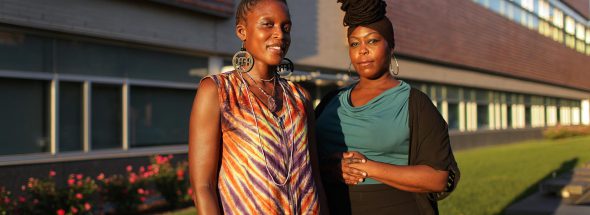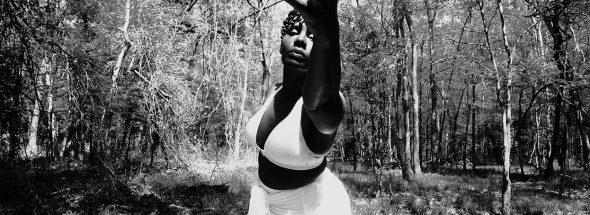
Fine art and documentary photographers Adama Delphine Fawundu and Laylah Amatullah Barrayn, the creators of the MFON: Women Photographers of the African Diaspora photo project, traveled to Kigali, Rwanda, to engage with a variety of communities and promote photography as a medium among artists and aspiring artists. During the course of their six-day exchange, the two women worked with groups from accomplished photographers to high school students, and other audiences in between.
The trip started with a visit to Rwanda’s Nyamata Genocide Memorial in Kigali, a former Roman Catholic Church transformed into a memorial. That afternoon they visited the Kigali Genocide Memorial Center, a building that is a memorial to victims, a historical museum teaching both about the genocide in Rwanda and genocide more broadly worldwide, and a center focused on preventing these kind of atrocities in the future. The visiting artists described the visit as giving “clarity about this significant part of Rwandan history”.
Throughout the week, Laylah and Delphine held multiple workshops, master classes, and discussion groups with a wide variety of communities through the Kigali area. They visited the Agahozo Shalom Youth Village east of Kigali, working with orphaned and vulnerable Rwandan youth. Here they led a small discussion and photography workshop with the group of school-age children, demonstrating both their own work and some of the fundamentals of photography as a discipline. The next day they led a master class for a dozen Rwandan photographers at the Kigali Center for Photography, focusing on an introduction to digital photography and photograph processing. There was also a similar presentation and discussion group at the White Dove Girls School, speaking with the students about art, messaging, and entrepreneurship, before the exchange concluded with a master class for more than twenty female Rwandan photographers, hosted at the Illume Creative Studio.
The idea behind the master classes was to work with program participants on acquiring additional photography skills and techniques, and to be inspired by the works of master photographers that they were unfamiliar with. The project seeks to balance images made of Africa with images made by Africans and by people of African descent. The workshops and outreach programs that were organized by U.S. Embassy Kigali and Art in Embassies in close coordination with Delphine and Laylah accomplished ”Exactly what we were hoping for when we agreed to participate in the Artist Exchange program.”
Peter Vrooman, the American Ambassador to Rwanda, and his wife Johnette Stubbs welcomed Delphine and Laylah as well as local contemporary artists at a reception for the unveiling of the Ambassador’s Art in Embassies exhibition. This provided an opportunity for the two women to meet with Rwandan artists and participate in a panel discussion on contemporary photography moderated by Ambassador Vrooman.

